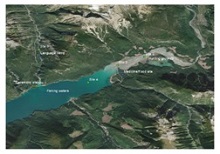AUTHORS
Abigail S. L. Lewis1, Dexter W. Howard1, Gerbrand Koren2, Cazimir Kowalski3, Jason McLachlan3, Jody A. Peters3, Georgia Smies4, and Olivia Tabares5
1 Department of Biological Sciences, Virginia Tech, Blacksburg, VA, USA
2 Copernicus Institute of Sustainable Development, Utrecht University, Utrecht, the Netherlands
3 Department of Biological Sciences, University of Notre Dame, Notre Dame, IN, USA
4 Division of Natural Resources, Salish Kootenai College, Pablo, Montana, USA
5 The American School Foundation, Ciudad de México, México
Corresponding author: Abigail S. L. Lewis (aslewis@vt.edu)
THE ISSUE
Working with ecological data often involves ethical considerations, particularly when data are applied to address societal needs. However, data science ethics are rarely included as part of undergraduate and graduate training programs. Here, we present four modules for teaching ethics in data science, with real-world case studies related to ecological forecasting.
FOUR DIMENSIONAL ECOLOGY EDUCATION (4DEE) FRAMEWORK
- Core Ecological Concepts:
- Organisms
- Abiotic and biotic features of the environment
- Communities
- Habitat types - terrestrial - marine - aquatic
- Biosphere
- Biogeography at the global level
- Global climate change
- Ecology Practices:
- Quantitative reasoning and computational thinking
- Statistics
- Data skills - inputting and data-mining / meta-analysis/ data
- Data analysis and interpretation
- Working collaboratively
- Communicating and applying ecology
- Human-Environment Interactions:
- Human accelerated environmental change - there is no pristine ecosystem nor total equilibrium
- Anthropogenic impacts, intentional and unintentional
- How humans shape and manage resources/ecosystems/the environment
- Agricultural ecosystems - fisheries
- Natural resource management
- Conservation biology
- Ecological stewardship
- Ethics - critical thinking about the values underlying how we approach and address environmental problems, challenges, and opportunities in environmental decision-making and policy
- Environmental ethics - basic types of ethics and their sources/foundations (includes ecological)
- Environmental justice
- Cross-cutting Themes:
- Systems
- Spatial & Temporal
- Scales
- Stability & change
STUDENT-ACTIVE APPROACHES
Each of the modules are structured in "Think, pair, share" discussions. Students take the time to reflect individually, then discuss in small groups and share with the class.
STUDENT ASSESSMENTS
Each module includes an optional essay assignment to assess student learning, with a suggested rubric.
CLASS TIME
Four independent modules, one hour each
COURSE CONTEXT
These stand-alone modules are designed to be flexible to a wide range of course contexts. We anticipate that in most cases, an instructor will choose to use only one of the four modules, and will choose the module that best matches their classes interests and needs (see descriptions below). However, each module covers a different topic related to ethics in ecological forecasting, and using multiple modules as part of a single course would provide increased training in the ethics of environmental data science.
All modules use a think-pair-share format for discussion, making them flexible to a wide range of class sizes. In very large courses, we note that it may be helpful to have teaching assistants who can help answer questions and engage with students during small group discussions.
Module 1: Flying foxes and uncertainty
- This module asks students to discuss ethical issues associated with the quantification and presentation of forecast uncertainty. As such, this module would connect well with data analysis lessons in an introductory ecology course or lab. In a forecasting-specific course, this module could be used as an introductory lesson to highlight the sources of forecast uncertainty and why uncertainty is necessary to include.
Module 2: Marine Fisheries and conflicts of interest
- This module focuses on the idea that forecasts may have multiple end users with different and potentially conflicting interests. This module would be beneficial in a general ecology or natural resources management class for discussing the benefits and challenges of public-facing research. In forecasting and data science classes this module would benefit discussions on end user engagement as a component of the forecast development process.
Module 3: Water Quality and Indigenous Knowledge
- This module focuses on the topic of scientific engagement with communities, with a case study of Indigenous communities and water quality. As such, this module would best be implemented in an introductory data science, forecasting, or ecology course, providing a discussion of how scientists can engage with impacted and marginalized communities. Due to the focus of this module, it may be most relevant for courses taught in the United States of America.
Module 4: Tropical forests and data availability
- This module addresses the (lack of) data availability to develop, validate or score ecological forecasts on a global scale. In particular, the module addresses underrepresentation of tropical ecosystems for studying vegetation dynamics. The themes of this module are broadly applicable to many classes, including courses in ecology and data science. The module is written to target advanced undergraduate students.
DOWNLOADS
Description of Resource Files:
Student handouts are provided as resources below, though instructors should refer to the full article text for module overviews, notes to instructor, and additional resources.
- Module 1: In-class handout [docx][pdf]
- Module 1: Essay handout [docx][pdf]
- Module 2: In-class handout [docx][pdf]
- Module 2: Pre-class reading [pdf]
- Module 2: Essay handout [docx][pdf]
- Module 3: In-class handout [docx][pdf]
- Module 3: Essay handout [docx][pdf]
- Module 4: In-class handout [docx][pdf]
- Module 4: In-class handout - Figure 3 [docx][pdf]
- Module 4: Essay handout [docx][pdf]
ACKNOWLEDGMENTS
Many thanks to Ryan McClure and Sydne Record for co-developing the idea for this project with co-author Abigail Lewis. This idea originated out of an Ecological Forecasting Initiative (EFI) Research Coordination Network meeting, which was supported by the U.S. National Science Foundation (NSF; DEB-1926388). Additionally, these case studies have been substantially improved by discussion and ideation within the EFI Education Working Group; many thanks to this group for their contributions. In developing these case studies, we were originally inspired in part by a blog post that discussed ethical considerations associated with COVID-19 forecasting (Record et al. 2020). Thanks to Nicholas Record and co-authors for writing that post, based on their experiences with ecological forecasting. Additionally, we thank Ian Shuman for developing one of the maps used in Module 3.
The development of these case studies was supported by numerous grants to individual collaborators. Abigail Lewis was supported by the U.S. National Science Foundation (NSF) graduate research fellowship program (DGE-1840995), US NSF grant DEB-1753639, the Institute for Critical Technology and Applied Science (ICTAS), and the College of Science Roundtable at Virginia Tech. Dexter Howard was supported by US NSF grants DBI-1933016 and DEB-1753639. Jody Peters was supported by funding from the Alfred P. Sloan Foundation. Many thanks to all of the funding sources that enabled the development of these teaching resources.
AUTHOR CONTRIBUTIONS
ASL wrote the overview for this set of teaching modules, as well as the text of Module 1. DWH and OT wrote Module 2. CK, JM, and GS wrote Module 3. GK wrote Module 4. JAP made substantial contributions to the manuscript development process through meeting coordination and project management. All authors edited and approved the final manuscript.
CITATION
Abigail S. L. Lewis, Dexter W. Howard, Gerbrand Koren, Cazimir Kowalski, Jason McLachlan, Jody A. Peters, Georgia Smies, and Olivia Tabares. December 2023. Ethics in ecological forecasting: four case-based teaching modules. Teaching Issues and Experiments in Ecology, Vol. 19: Practice #13. https://tiee.esa.org/vol/v19/issues/case_studies/lewis/abstract.html



